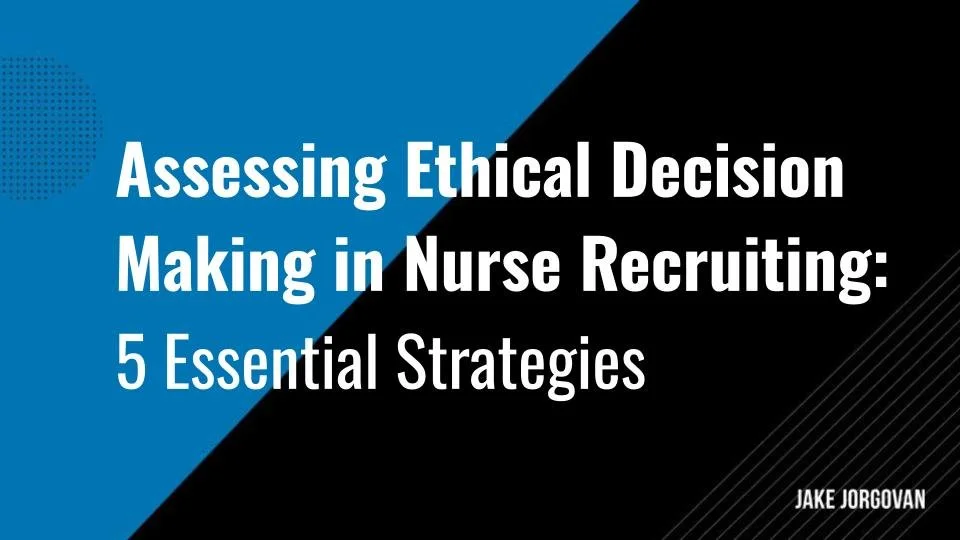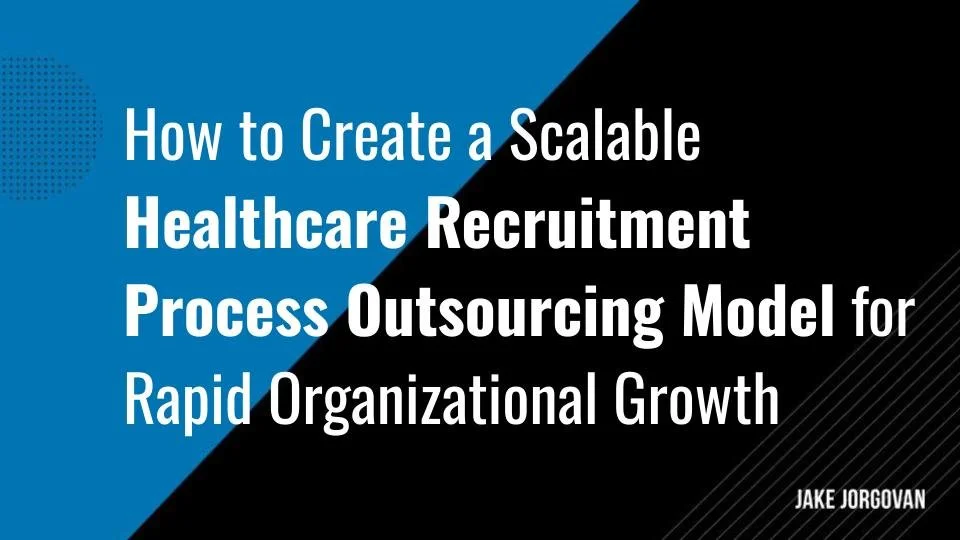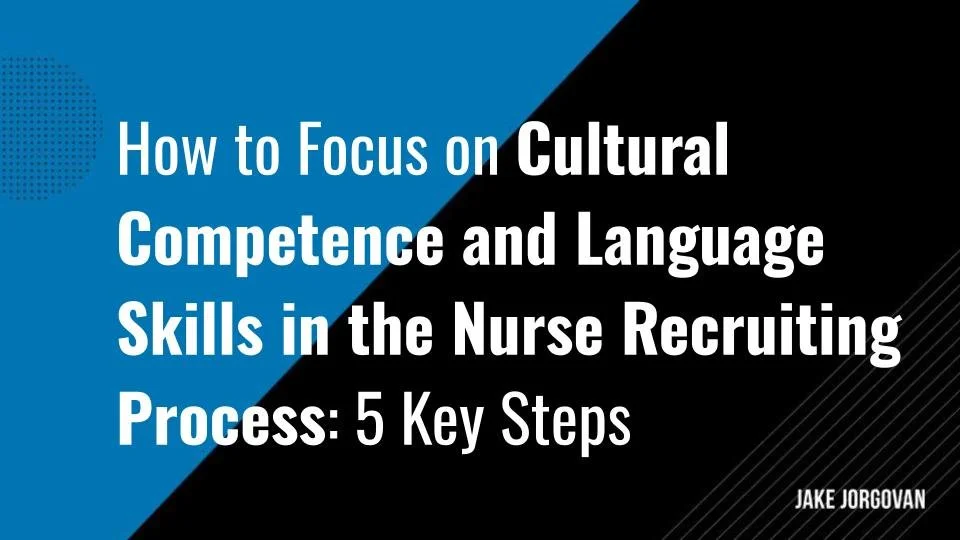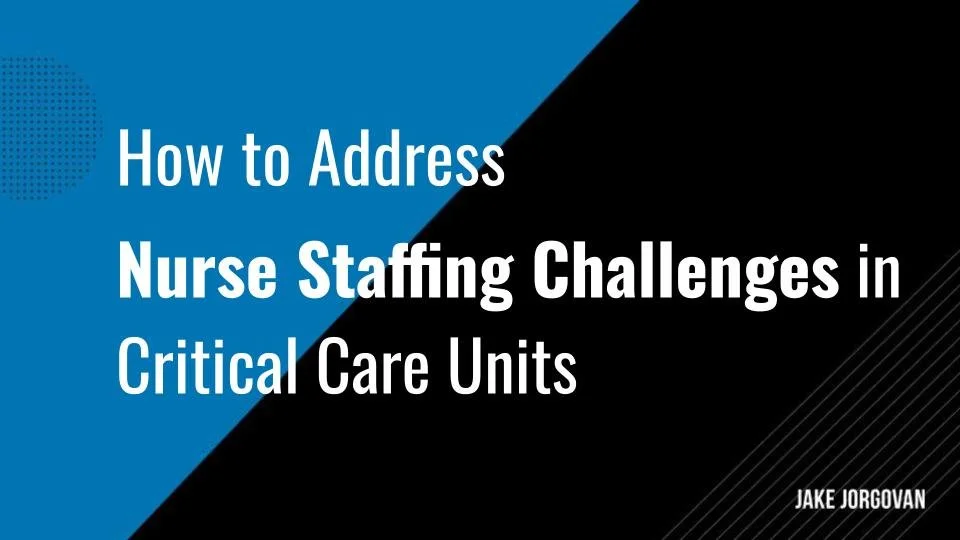Assessing Ethical Decision Making in Nurse Recruiting: 5 Essential Strategies
Hiring nurses with strong ethical decision-making skills is crucial in today's healthcare environment.
Ethical dilemmas arise daily, and nurses must navigate them with integrity and precision.
But how can recruiters accurately assess these skills during the hiring process?
Traditional interviews often fall short in revealing a candidate's true ethical judgment.
This article explores five essential strategies to evaluate a nurse's ethical decision-making ability and provides recruiters with actionable insights.
These methods will ensure healthcare teams are staffed with professionals who uphold the highest ethical standards in patient care.
Let's get started.
How to Assess the Ethical Decision-Making of Nurses
1) Use Scenario-Based Interview Questions Focused on Ethical Dilemmas
In healthcare, nurses frequently face complex decisions that test their ethical compass. You must probe deeply into their thought processes to gauge a candidate's ability to navigate these situations. Merely asking theoretical questions won’t suffice. You must challenge them with scenarios that mirror real-life ethical challenges to understand how they prioritize patient care and integrity in high-stakes situations. Here’s how:
Prepare realistic scenarios: Craft scenarios based on your institution’s common ethical dilemmas and tailored to your specific clinical setting. This will highlight whether the candidate can meet your organization’s ethical standards.
Ask open-ended questions: Based on these scenarios, pose open-ended questions. This forces the candidate to think critically and provide comprehensive responses instead of offering rehearsed answers.
Focus on decision-making rationale: Ask the candidate what decision they would make and why. The focus is on how they arrive at their choices, reflecting their underlying ethical framework.
Probe for alternative solutions: Encourage the candidate to consider multiple solutions. This shows flexibility in their ethical thinking, essential for navigating diverse patient needs.
Evaluate their risk management approach: Assess how the candidate balances patient well-being with institutional policies and legal considerations. This will give insight into how they manage ethical risks in practice.
Insider Tip: When crafting scenario-based questions, we recommend referencing high-risk areas from recent case studies in your field. This makes the questions relevant and helps you assess how up-to-date the candidate’s ethical knowledge is with current clinical challenges.
2) Implement Situational Judgment Tests (SJTs) to Evaluate Decision-Making
Hiring nurses who can handle complex ethical decisions requires more than an interview. You need to evaluate how they approach real-world dilemmas under pressure. That’s where situational judgment tests (SJTs) come into play. These tools simulate challenging situations and help you understand a candidate’s judgment and values in practice. Here’s how to use this strategy:
Develop clinical scenarios: Use ethically charged, realistic clinical cases that represent the toughest situations nurses will face in your environment. Ensure the scenarios are relevant to the level of responsibility the candidate will hold.
Present multiple-choice options: For each scenario, give candidates several response options. The choices should reflect a range of ethical and practical solutions, from suboptimal to ideal, so you can assess their ability to choose the best course of action.
Score responses based on priorities: Rank the response options according to your organization’s values and ethical standards. Pay close attention to how candidates balance patient care with policies, safety, and teamwork.
Look for patterns in decision-making: Examine how consistently the candidate chooses patient-centered approaches. This will tell you if their ethical framework is aligned with your institution’s practices.
Combine SJTs with interviews: Use the SJT results as a foundation for further interview probing. This ensures a deeper dive into their thought processes and provides a fuller picture of their ethical decision-making.
Insider Tip: When selecting or developing SJTs, we recommend working closely with your clinical leadership team to identify critical areas where ethical lapses are most common. This ensures your tests focus on high-risk scenarios and gives you a clearer insight into candidates’ practical ethics under pressure.
3) Review Past Clinical Experiences for Evidence of Ethical Behavior
A nurse's past clinical experience can reveal more about their ethical decision-making than hypothetical scenarios. Reviewing their history helps you see how they acted when faced with real patients and dilemmas. This step allows you to determine whether their ethical choices align with your institution’s values. To effectively evaluate these experiences, follow this approach:
Request detailed case summaries: Ask the candidate to provide examples of past cases where they had to navigate ethical challenges. Focus on specific situations involving patient care, confidentiality, or conflicts between colleagues.
Analyze their decision-making process: Go beyond the outcome. Look at how the nurse processed the ethical dilemma. Did they consider patient autonomy, safety, or institutional policy when making their decisions? This shows the depth of their ethical reasoning.
Evaluate the complexity of their cases: Prioritize cases that involve nuanced ethical challenges rather than straightforward decisions. This will give you insight into how the candidate handles ambiguity and conflicting priorities.
Look for consistency: Review multiple experiences to ensure the candidate demonstrates a consistent ethical approach across various situations. Inconsistencies might suggest situational ethics, which could lead to unpredictability in critical care.
Discuss the lessons learned: Ask what the candidate took away from these cases. Their ability to reflect and grow from challenging situations is key to understanding how they might improve your team’s ethical standards.
Insider Tip: We suggest asking candidates for specific cases involving difficult colleagues or resource limitations. These contexts often reveal deeper ethical behavior since they push nurses to make tough choices when facing systemic pressures. This provides richer insight into how they will perform under real-world constraints.
4) Incorporate Peer and Supervisor Reference Checks Focused on Ethics
Ethics in nursing isn’t just about clinical skills—it’s also reflected in how colleagues and supervisors perceive a nurse’s behavior. You can gain critical insights into a candidate's ethical mindset through the observations of those who have worked alongside them. Peer and supervisor reference checks can reveal patterns that may not come up in interviews. To conduct these checks effectively, follow these steps:
Request specific examples: Ask peers and supervisors to provide detailed examples of ethical situations the candidate has encountered. Focus on incidents that required tough decisions or involved conflicts of interest.
Look for consistency across feedback: Gather references from multiple sources to ensure a well-rounded perspective. Consistent feedback about the candidate’s integrity and ethical approach is more reliable than a single glowing recommendation.
Ask about interpersonal ethics: Go beyond clinical skills. Ask about how the candidate handles disagreements, respects patient privacy, and balances team dynamics. This reveals how they apply ethical principles in their day-to-day work with others.
Evaluate the candidate’s adaptability: Look for references that comment on how the candidate responds to evolving ethical challenges. Adaptability is crucial in a healthcare setting when adapting to new policies or complex patient situations.
Analyze their leadership in ethical situations: If applicable, ask how the candidate handled leadership roles when faced with ethical decisions. Leadership often magnifies ethical pressures, providing a clearer window into their decision-making process.
Insider Tip: It’s helpful to prepare structured reference forms with specific ethical decision-making questions. Tailoring these forms to your facility’s ethical guidelines helps filter out vague or generic responses and ensures the feedback aligns with your standards.
5) Utilize Behavioral Assessment Tools That Measure Integrity and Ethical Reasoning
When hiring nurses, it’s critical to assess more than their technical skills. A nurse’s integrity and ethical reasoning directly affect patient outcomes and team dynamics. Behavioral assessment tools can help you objectively measure these traits. These tools evaluate how a candidate’s behavior aligns with ethical standards and responsibilities. Follow the steps below to implement these tools:
Select validated tools: Use behavioral assessments specifically designed for healthcare professionals. These tools should evaluate key areas such as integrity, honesty, and ethical reasoning based on industry standards.
Customize the assessment: Tailor the tool to your organization’s core values and ethical guidelines. This ensures you measure behaviors that matter most to your clinical setting, such as patient advocacy or adherence to privacy standards.
Analyze behavioral trends: Look for patterns in the candidate’s responses to ethical dilemmas. Assess whether they consistently prioritize patient care and align with your institution’s ethical approach in challenging situations.
Combine assessments with interviews: Integrate the findings into follow-up interview questions after reviewing the results. This allows you to explore specific areas further and gain deeper insights into the candidate’s thought processes.
Focus on key competencies: Make sure the assessment measures competencies such as conflict resolution, accountability, and respect for patient autonomy. These areas are critical for maintaining high ethical standards in daily practice.
Insider Tip: We recommend regularly updating your behavioral assessment tools to reflect changes in healthcare regulations and ethical challenges. This ensures that the tools remain relevant and continue to provide you with actionable data about your candidates' ethical behavior.
Hire Nurses with Ethical Decision-Making Skills
Assessing ethical decision-making in nurses is not just a hiring box to check.
It directly impacts patient outcomes and the integrity of healthcare teams.
Recruiters must go beyond surface-level assessments and dig deeper into a candidate's ethical judgment.
With the right strategies, you can hire nurses who consistently make the right choices under pressure and set your organization up for success.































